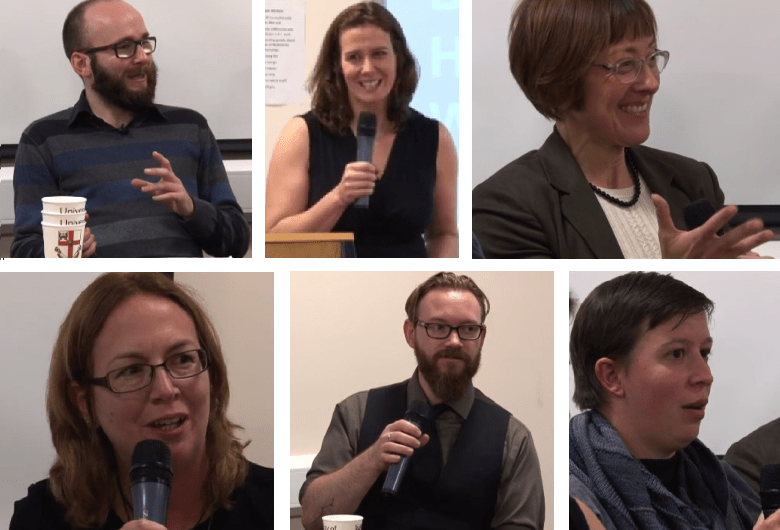This week we are bringing you the fruits of a recent RSP venture to the University of Chester, UK. In the early afternoon, Chris and David ran a workshop on “Digital Humanities” for the postgraduate community in the Department of Theology and Religious Studies. Later on, David interviewed Dr. Alana Vincent in from of a ‘live studio audience’ on the topic of ‘Religion and Literature‘. Following directly on from this, Chris chaired a roundtable discussion on ‘Narrative and Reflexivity in the Study of Religion’ featuring Dr. Wendy Dossett, Prof. Elaine Graham, Dr. Dawn Llewellyn and Dr. Alana Vincent — all staff in TRS at Chester — and the RSP’s own Ethan Quillen, of the University of Edinburgh.
The idea for this roundtable was that it would follow on directly from the interview on religion and literature, but expand the discussion to cover a variety of points relating to narrative, autobiography and (auto)ethnography in the study of religion. This was also recorded in front of a live audience, and towards the end of the recording we take questions from the floor.
Thanks to the resources available at the University of Chester — specifically, a wonderful chap named Lee — we are able to bring you this roundtable discussion in video form — something a lot of our listeners have been keen on for quite some time. Let us know what you think! We can’t promise to do this very regularly, but if it is useful we will definitely investigate our options for the future.
Discussion addressed the following questions, and a lot more…
- What do we mean when we speak of incorporating narratives into Religious Studies? Why would we want to?
- What makes a narrative different from a discourse? Is there any difference?
- Does studying narrative minimize other aspects of ‘religion’ such as ritual, embodiment, symbols etc? Is there anything particularly Western or gendered about privileging narratives?
- Given that we focused upon ‘religion and literature’, what is the place of fictional narratives? What can they tell us? Are all narratives fictions? Can one infer anything external to a narrative?
- What is the place of the scholar in all of this? Are we interpreters? Are we co-creators of narratives? Do we remain outside the data we study or must we write ourselves in? What would this do to ‘objectivity’? Is the whole academic enterprise an exercise in creating narratives? Can academic reflexivity go to too far?
This podcast is presented to you as a co-production with the University of Chester, and we are very grateful for their help in making this happen — particularly to Dawn Llewellyn for organizing, and to Lee Bennett for the technical wizardry.











